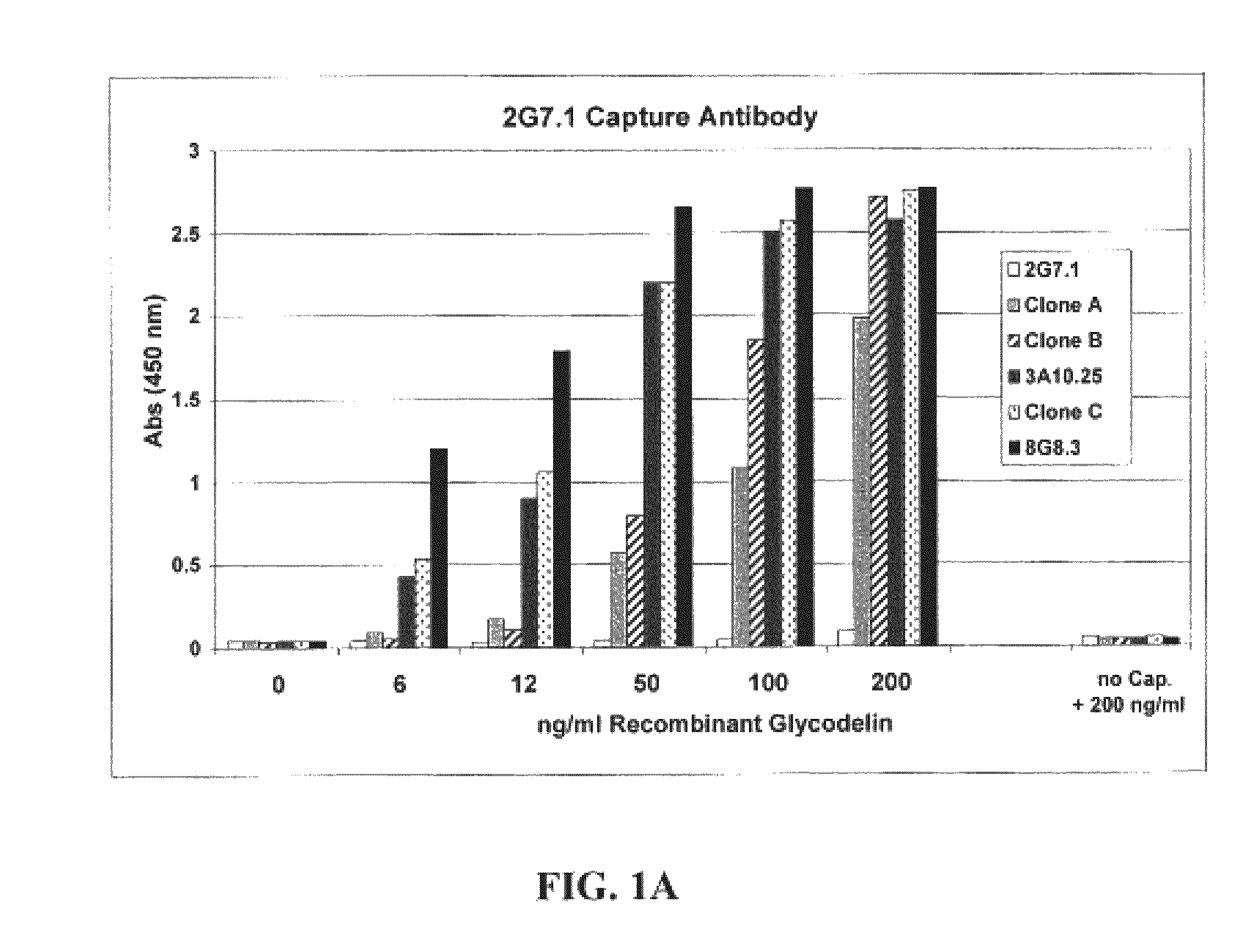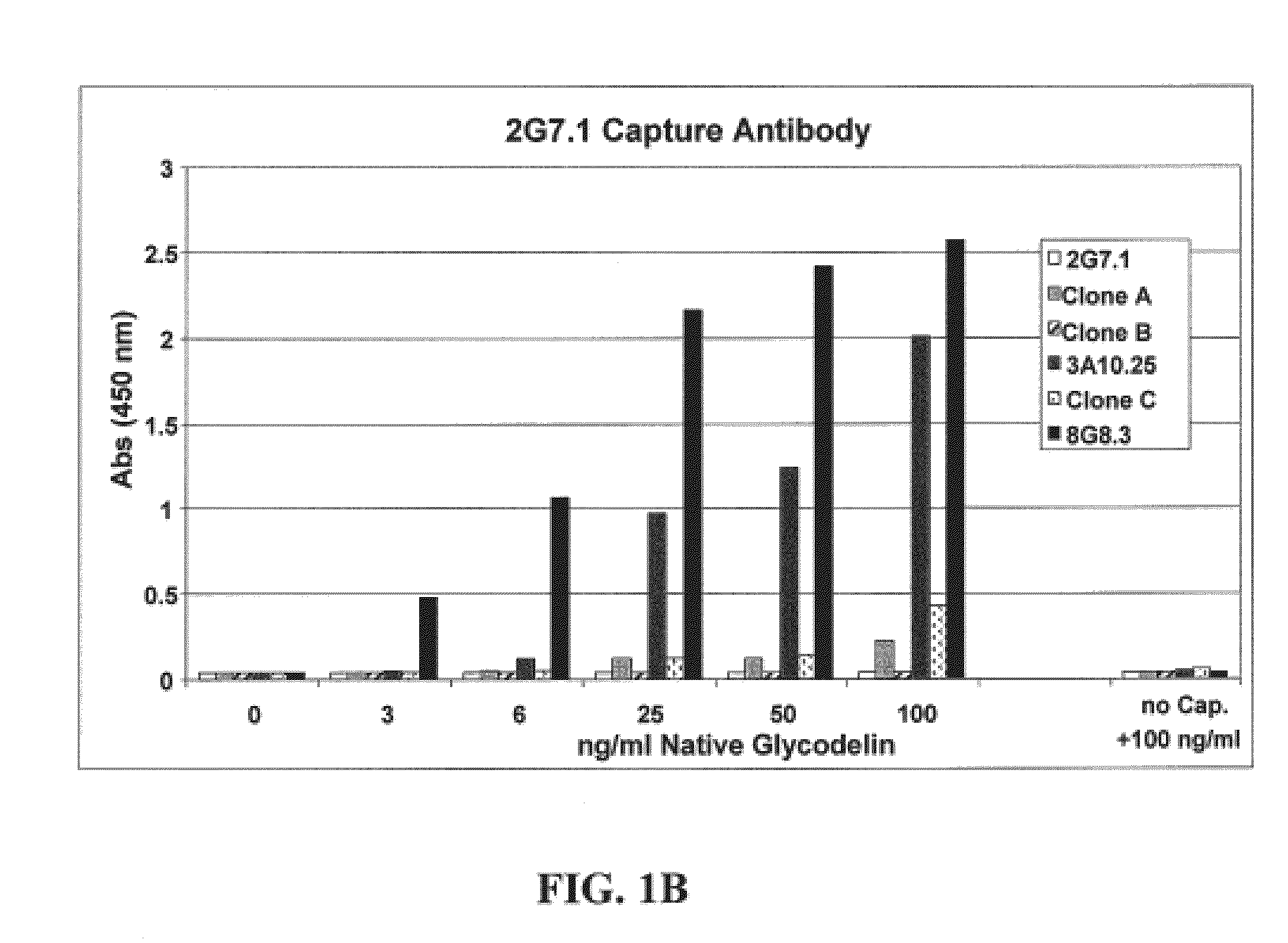Glycodelin monoclonal antibodies and methods for their use in the detection of ovarian cancer
a technology of ovarian cancer and monoclonal antibodies, which is applied in the field of monoclonal antibodies, can solve the problems of no recognition, increased risk of ovarian cancer, and stepwise progression of ovarian cancer through defined precursor lesions, and achieves the effect of improving clinical outcomes and increasing survival
- Summary
- Abstract
- Description
- Claims
- Application Information
AI Technical Summary
Benefits of technology
Problems solved by technology
Method used
Image
Examples
example 1
Production of Mouse Monoclonal Antibodies to Glycodelin
[0076]Recombinant antigen immunization strategies were undertaken to generate mouse monoclonal antibodies specific for glycodelin. The immunogenic polypeptide used to produce the mouse glycodelin monoclonal antibodies comprised the glycodelin sequence (SEQ ID NO:1) fused to a small polypeptide linker and a carboxy-terminal hexahistidine tag. The sequence of the glycodelin immunogenic polypeptide is set forth in SEQ ID NO:4. The immunogenic glycodelin polypeptide was overexpressed in a HEK (human embryonic kidney) cell line that contains the nucleic acid encoding the Epstein-Barr Nuclear Antigen, and the hexahistidine-tagged glycodelin protein was purified from the media fraction using a chelating agarose charged with Ni+2 ions (Ni-NTA, Qiagen Inc.).
[0077]Mice were then immunized with the purified glycodelin protein and lymphocyte fusions were accomplished by performing Repetitive Immunizations Multiple Sites technology (RIMMS), ...
example 2
General Method for Epitope Mapping
General Approach
[0079]Epitope mapping was performed essentially as described in U.S. Patent Application Publication No. 2006 / 0252106 to identify the linear or non-linear, discontiguous amino acid sequence within an antigenic protein (i.e., the epitope in, for example, glycodelin) that is recognized by a particular monoclonal antibody. A general approach for epitope mapping requires the expression of the full-length protein, as well as various fragments (i.e., truncated forms) of the protein, generally in a heterologous expression system. These various recombinant proteins are then used to determine if the specific monoclonal antibody is capable of binding one or more of the truncated forms of the target protein. Through the use of reiterative truncation and the generation of recombinant proteins with overlapping amino acid regions, it is possible to identify the region that is recognized by the monoclonal antibody under investigation. Western blot a...
example 3
Sandwich ELISA Assay Utilizing Glycodelin Monoclonal Antibodies 2G7.1 and 8G8.3 to Detect Glycodelin in Ovarian Cancer in Patient Serum Samples
[0084]The sandwich ELISA immunoassay was used to detect glycodelin in sera from ovarian cancer patents and ovarian cancer-free patients. The capture antibody used in this set of experiments, the 2G7.1 glycodelin antibody, was bound to a microtiter plate well by passive absorption. The 8G8.3 antibody was used as the detector antibody and was labeled with a horseradish peroxidase (HRP) for detection of antigen-antibody binding. The patient sera samples were analyzed using the sandwich ELISA technique, essentially as described above, to measure glycodelin levels in sera from a patient cohort of 91 ovarian cancer patients, at various stages of the disease, and 89 “normal” patients not suffering from ovarian cancer. Specifically, the chromagen tetramethylbenzidine (TMB) was added, and optical density (OD) at 450 nm was determined. A cut-off thresh...
PUM
| Property | Measurement | Unit |
|---|---|---|
| Fraction | aaaaa | aaaaa |
Abstract
Description
Claims
Application Information
 Login to View More
Login to View More - R&D
- Intellectual Property
- Life Sciences
- Materials
- Tech Scout
- Unparalleled Data Quality
- Higher Quality Content
- 60% Fewer Hallucinations
Browse by: Latest US Patents, China's latest patents, Technical Efficacy Thesaurus, Application Domain, Technology Topic, Popular Technical Reports.
© 2025 PatSnap. All rights reserved.Legal|Privacy policy|Modern Slavery Act Transparency Statement|Sitemap|About US| Contact US: help@patsnap.com



